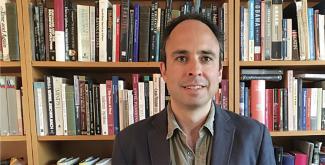The Center will build on the work of the DCC, an initiative established with Mellon Foundation support in 2006. The Center’s leadership is changing as well, with Jeffrey Green, Associate Professor of Political Science, taking over from founding director Rogers Smith, Christopher H. Browne Distinguished Professor of Political Science and Associate Dean for the Social Sciences.
The Center’s most exciting new programing focuses on undergraduates. “Our programming over the last decade has been extremely successful, but was primarily for faculty and graduate students,” says Green. “We’re looking forward to the opportunity to connect more directly with our undergraduates.”
One of these new initiatives is a partnership with the Penn Political Union, an undergraduate organization that engages in mock parliamentary debates. The students organize themselves into five political parties, which cover a wide spectrum of political ideology. “We’re not only going to sponsor their debates, but sponsor outside speakers,” says Green.
A second new initiative is called Politics on the Edge. This will see the Center interfacing with the Penn Philomathean Society, a literary society that has been in operation since the early 19thcentury and includes students with varied experiences and points of view. “It’s a great, rigorous, diverse organization that brings together very intellectually minded students from broad backgrounds and interests,” Green observes.
The first Politics on the Edge speaker will be Jared Beck. Beck is leading a class-action lawsuit against the Democratic National Committee, claiming that it did not fairly represent Bernie Sanders and that it was biased in favor of Hillary Clinton. There are at least 10,000 fellow litigants whom he’s working with, and he has a book forthcoming that is going to respond to Hillary Clinton’s claims about what went wrong in her election. “The plan,” Green adds, “is to sponsor speakers to visit and engage in discussion in a more informal, far-reaching, perhaps controversial fashion with this group.”
One of the Center’s main goals, Green says, is to promote a kind of discourse that is both partisan and independent-minded, where students hold points of view shaped by their backgrounds and ideological positions, but are open to learning from others. “I hope that the conversations will be lively and provocative but also serious, fact-driven, evidence-driven, and open-minded,” says Green. “I think that many of us feel, especially in this moment that we’re in, that this type of civil discourse is scarce.”
The 2017 – 2018 theme for the Andrea Mitchell Center is “States of Religious Freedom.” The opening event, held this past September at the National Constitution Center, was an interfaith discussion between scholars from different religious and secular backgrounds. The Center continues examining the theme, and engaging undergraduates, with monthly talks featuring invited scholars who speak to issues of religious liberty. The year will conclude with a conference with leading scholars from around the world.
Next year’s theme will be “Democracy in Trouble?” Green is interested in exploring discourse that might help overcome divisiveness by not restricting the programming to a specific platform, as well as trying to explore some of the opponents of the democratic regime itself.
This gift from Mitchell and Greenspan will enable the Center to establish new programming that will address ongoing social and political issues. One of Green’s goals is to create a race and politics initiative that would be partnered with minority student associations on campus and would bring in speakers to address topics relevant to ongoing issues in the U.S., as well as around the world. “I see the Andrea Mitchell Center as being intellectually involved in that quest of how to understand the meaning of democracy in a world where it doesn’t seem to ever be fully realized at any given time,” says Green.
www.sas.upenn.edu/andrea-mitchell-center/

